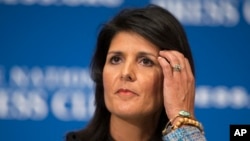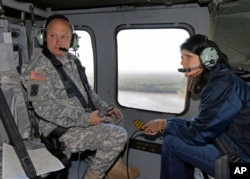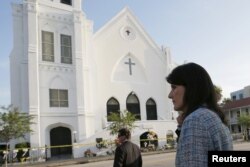After a year when a church massacre and catastrophic flooding put her in the spotlight, South Carolina Gov. Nikki Haley will get further national exposure when she gives the Republican response to the State of the Union address.
But she's not new to the national stage. In 2012, she spoke at the Republican National Convention and campaigned for past GOP presidential nominee Mitt Romney. She also promoted her 2012 memoir with a national book tour.
On Tuesday, House Speaker Paul Ryan and Senate Majority Leader Mitch McConnell jointly announced that Haley will speak for Republicans after President Barack Obama's Jan. 12 speech.
Haley has "demonstrated how bringing people together can bring real results," McConnell said in a statement on her selection. "Gov. Haley knows the American dream and wants to see every American share in it."
The South Carolina-born daughter of Indian immigrants is the state's first female and first minority governor. Haley, who will turn 44 a week after the address, is also the country's youngest governor.
The selection will likely fuel speculation that Haley would join a potential Republican administration in 2017, though she has repeatedly dismissed such questions.
Republican Response to State of the Union address
Republican Response to State of the Union address
President Barack Obama will give his eighth State of the Union address January 12.
The State of the Union address is a message from the president to Congress, usually given once a year in January or February. It is customary for the party not in control of the White House to speak in response to the president's address, and the honor is usually given to a lawmaker who is gaining stature in that party.
Here are the previous Republicans who have given the GOP response during Obama's tenure:
February 24, 2009: Louisiana Governor Bobby Jindal
January 27, 2010: Virginia Governor Bob McDonnell
January 25, 2011: U.S. Representative Paul Ryan, who is now Speaker of the House
January 24, 2012: Indiana Governor Mitch Daniels
February 12, 2013: Florida Senator Marco Rubio, who is now running for the Republican presidential nomination in 2016.
January 28, 2014: U.S. Representative Cathy McMorris Rodgers of Washington state
January 20, 2015: U.S. Senator Joni Ernst of Iowa
January 12, 2016: South Carolina Governor Nikki Haley
Sources: The White House, American Presidency Project
First presidential primary in South
Haley, governor of a state that holds the first presidential primary in the South, becomes the first South Carolinian and third Republican woman ever to give the response. It's a role typically reserved for a member of Congress. Last year, Sen. Joni Ernst of Iowa gave the response. In 2013, it was Sen. Marco Rubio of Florida, who's now among a crowded Republican field running for president.
It's also an opportunity that can backfire: Louisiana Gov. Bobby Jindal, who abandoned his 2016 presidential bid, was widely panned for what critics said was a less-than-spectacular speech in 2009.
Haley drew wide praise for her leadership after the June 17 slaying of nine black parishioners of historic Emanuel AME Church in Charleston, as she conveyed the state's grief and successfully led calls to bring down a Confederate flag that had flown on Statehouse grounds for 54 years.
The nine killed included the church's pastor, state Sen. Clementa Pinckney. The white man charged with killing them could be seen in photos brandishing the rebel flag.
Since taking office in 2011, Haley has staunchly criticized Obama on everything from health care reform to immigration. But the two seemed to share a vision, if only partially, after the shooting.
Shooting victims
Haley, who attended funerals for all of the massacre's victims, has said the event motived by "pure hate" will "forever change the way I live my life." In calling for the flag's removal, she acknowledged the differing views that for years prevented politicians, including herself, from even broaching the subject.
"My hope is that by removing a symbol that divides us, we can move our state forward in harmony," she said.
The bipartisan crowd surrounding Haley during that emotional speech included Republican National Committee Chairman Reince Priebus.
Giving an impassioned eulogy at Pinckney's funeral, Obama, too, called for the Confederate flag to be removed from places of honor.
Within weeks of the shooting, legislators approved removing the flag from its 30-foot perch outside the Statehouse and sending it to a museum.
Obama also called for gun control in eulogizing Pinckney, and Pinckney's widow stood with Obama on Tuesday as he unveiled his plan to use presidential powers to tighten control and enforcement of firearms in the U.S. He insisted it was possible to uphold the Second Amendment while doing something to tackle the frequency of mass shootings in the U.S.
But Haley has defended gun rights and previously criticized Obama as overreaching his authority. She holds a concealed carry permit, and she posted a picture on social media in 2013 of the handgun her husband gave her for Christmas.
Haley said she was honored to be asked to deliver the address.
"This is a time of great challenges for our country, but also of great opportunities. I intend to speak about both," she said.






